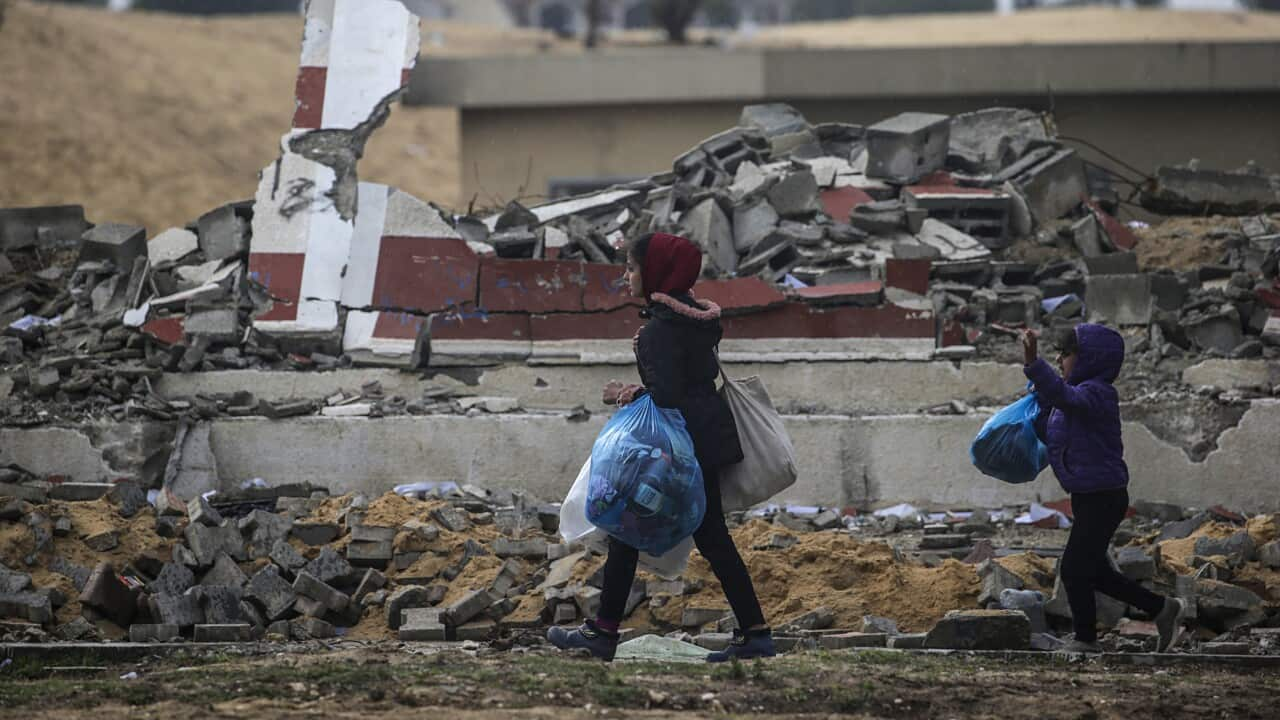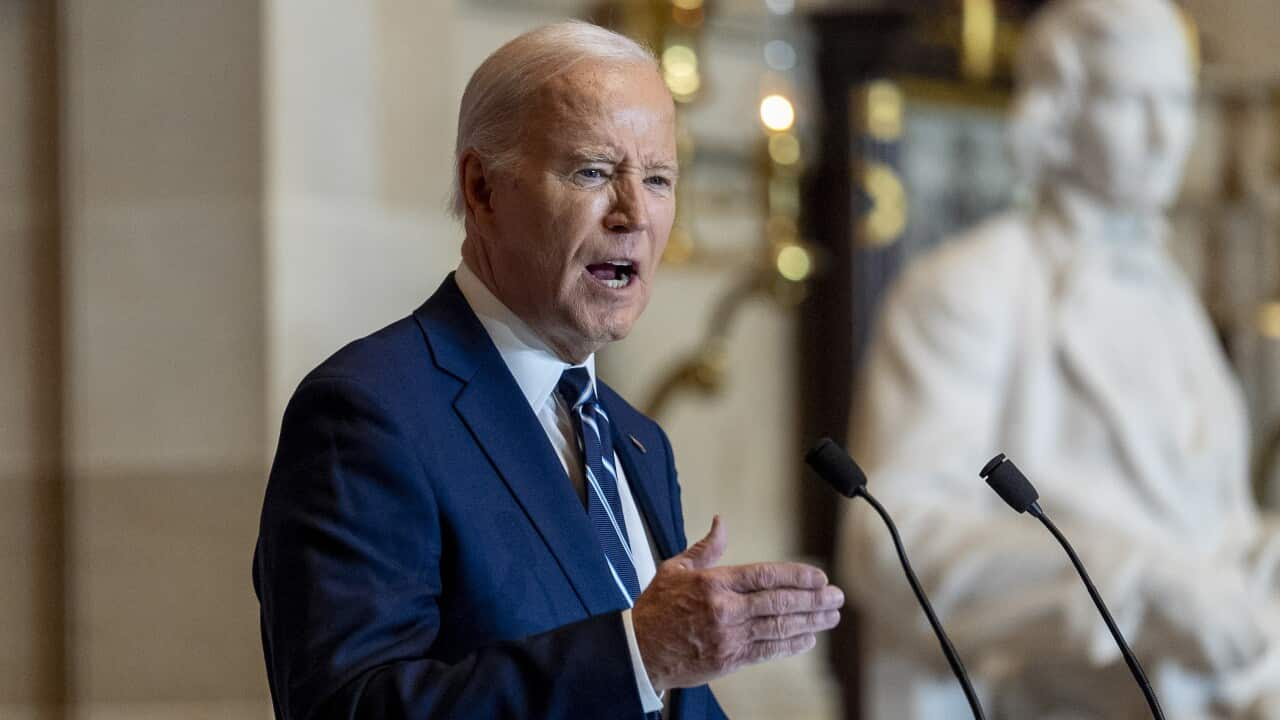Key Points
- Benjamin Netanyahu says 17 of Hamas’ 24 battalions have been "annihilated" with most of them now in Gaza's south.
- Experts say such claims could signal an "endpoint" to the conflict but should be "taken with a pinch of salt".
- Israel's military campaign has moved into Gaza's south, the last refuge for displaced civilians in the enclave.
Israeli Prime Minister Benjamin Netanyahu has declared that the Israeli military is from the Gaza Strip, comments that some experts claim could point to a forthcoming de-escalation of violence within the enclave.
Speaking at a weekly cabinet meeting on Sunday, Netanyahu said 17 of Hamas’ 24 battalions had been "annihilated". Most of the group’s remaining forces, he added, have now gathered in Gaza's south, in areas such as the , which is currently housing more than half of the territory's 2.3 million population.
Netanyahu further stressed that the total extermination of Hamas is Israel’s major goal, raising fears of more bloodshed in southern Gaza, the last refuge for hundreds of thousands of displaced civilians. More than 27,000 Palestinians have been killed since the latest violence began.
His reaffirmation of the objective has also tempered hopes that Israel’s months-long bombardment of the enclave may soon start winding down.

Source: SBS News
Is Israel about to defeat Hamas?
If Netanyahu’s claims about Hamas’ diminishing numbers are true, it could be "promising for a peaceful solution in the coming weeks", said Sally Totman, an expert in Middle East politics and head of Charles Sturt University’s School of Social Work and Arts.
However, she also cautioned that everything Netanyahu says should be "taken with a pinch of salt."
"Israel tells us externally what they'd like us to know, not necessarily what the whole truth is and nothing but the truth," Totman told SBS News.
"So it's really hard to make an assessment of whether or not Hamas is nearly finished".
Complicating Netanyahu's claim of Hamas' imminent defeat, the Associated Press reported on 4 February that the group has begun to reemerge in areas from which Israel withdrew its forces a month prior and is now deploying police and making payments to some civil servants.
Donald Rothwell, a professor of international law at the Australian National University’s College of Law, similarly suggested that if Israel is truly nearing the completion of eliminating Hamas, "we could possibly be reaching an endpoint in terms of the current hostilities in Gaza."
But while Israel has underscored what the terms of that endpoint might be — namely, complete eradication — Rothwell pointed out that the reality is unlikely to be as clear-cut.
"The question becomes: what exactly is the end of the conflict?" Rothwell told SBS News. "Is Hamas going to suddenly capitulate completely? Are they going to surrender completely?
"It's very difficult to define exactly how one reaches an endpoint here in terms of the absolute elimination of Hamas."
Is a political settlement possible?
Rothwell believes it’s more likely that Netanyahu’s comments about having destroyed most of Hamas’ battalions might provide a way for Israel to negotiate a "political settlement" to the conflict, under which Israel would acquiesce to international demands for a ceasefire by "accepting that they've gone as far as they can in terms of responding to the Hamas attacks".
Israel has come under increasing pressure from its international supporters and allies — most notably the United States — to bring an end to the current violence in Gaza.
A week-long pause in fighting was accepted by Israel and Hamas in November 2023, with an initial exchange agreed upon of 50 Israeli hostages held in Gaza and 150 Palestinian prisoners held in Israel.
By the end of the temporary truce, Hamas had released 105 hostages over that period, while Israel had released 240 Palestinian prisoners.
Further permanent ceasefire proposals have been rejected by Israel. Netanyahu has consistently stated that Israel would continue its military action in Gaza until all hostages are released and Hamas is destroyed.
Rothwell explained that if Israel were to announce victory over Hamas, Netanyahu could accept a ceasefire without the optics of acquiescence.
"Israel could be able to claim that Hamas has been eliminated and therefore at the same time agree to whatever ceasefire arrangements or terms are ultimately negotiated," said Rothwell.
"And in doing so, Israel and Netanyahu would no doubt seek to claim victory."
What might happen next?
Even if such a settlement were to transpire, Netanyahu might find himself facing new difficulties.
As Totman pointed out, an end to the conflict in Gaza will bring about an investigation into the events that started it: namely, the security failures that allowed Hamas’ 7 October attack against Israel to occur.
"So in one respect, he needs to bring this to a close and achieve his goals — and in another, as soon as he does that, it opens up a whole other set of problems for him personally," Totman explained.
For now, the conflict continues.
In Gaza City in the north and fighting has continued, showing Hamas still has some control in those areas, while a potential push into the south by Israeli troops has alarmed thousands of Palestinians who have fled to the Rafah border trying to escape the conflict.
The Gaza health ministry, which does not differentiate between militants and civilians in their tallies, said on Sunday that more than 27,300 Palestinians have been killed in the war, 70 per cent of whom were women and children.
While a ceasefire may bring an end to the bloodshed, will be felt for a long time to come, said Totman.
"Even if the war ended tomorrow, even if there was a ceasefire and all the hostages were returned and everything stopped, there's a huge amount of devastation — in Gaza in particular, but on both sides," she said.
"This war is costing Israel economically hugely, not just in terms of the military costs themselves, but the loss of economics, loss of tourism — [a] whole bunch of different things."
"It's going to take a long time before Israel, Gaza and the West Bank get back to even close to where they were pre-October 7."
The war between Hamas and Israel is the latest escalation in a long-standing regional conflict.
Hamas in its entirety is listed as a terrorist organisation by Israel, United States, the European Union, Australia, Canada, the United Kingdom, Japan and Paraguay. Other countries list only its military wing as a terrorist group.
The UN did not condemn Hamas in its entirety as a terrorist organisation, due to insufficient support from member states during a 2018 vote.
In 2021 the International Criminal Court opened a formal ongoing investigation into alleged Israeli war crimes in the Palestinian territories dating back to 2014, including the recent Israeli military activity in Gaza and the West Bank as well as Hamas’ attack in Israel.




